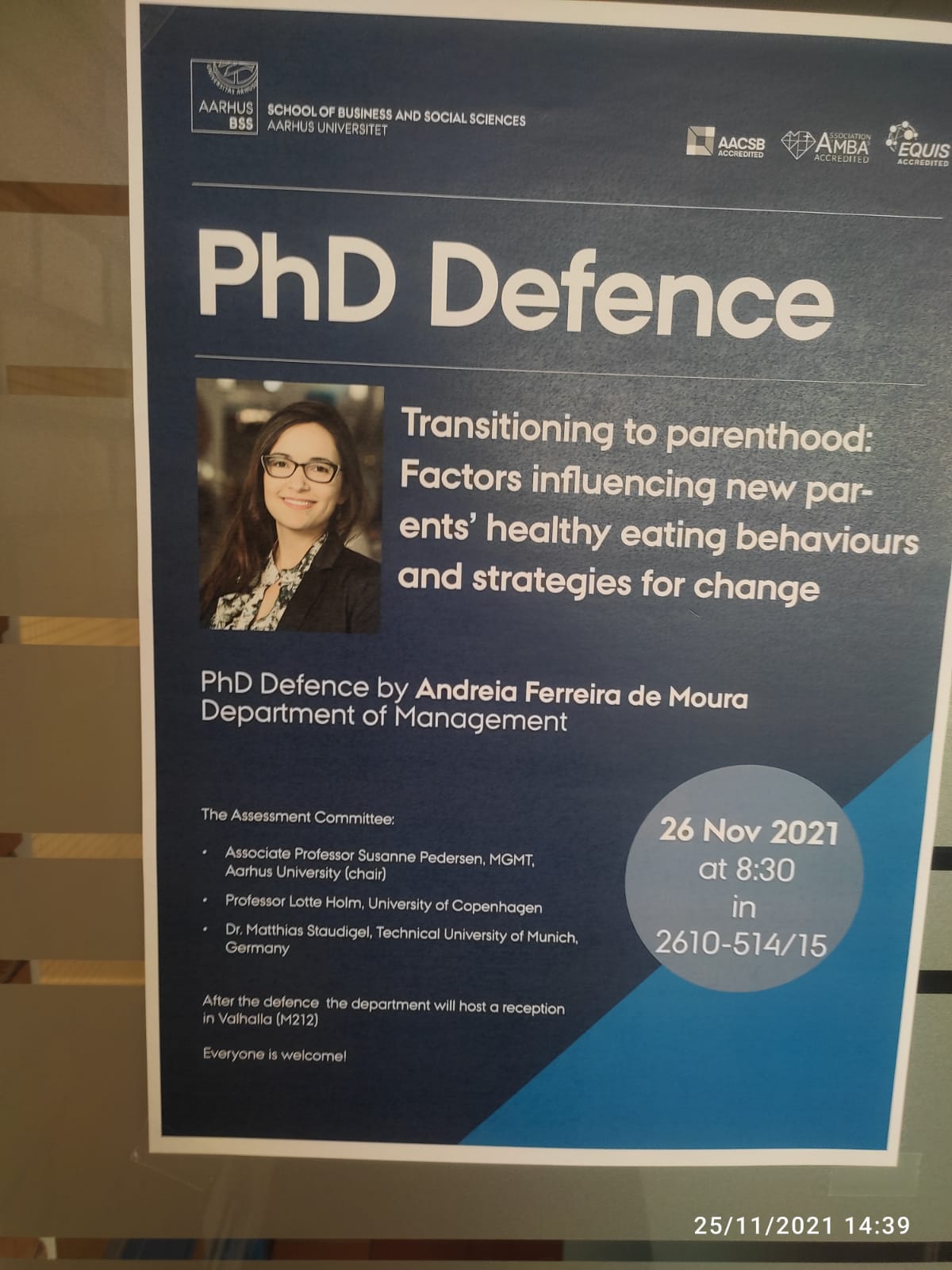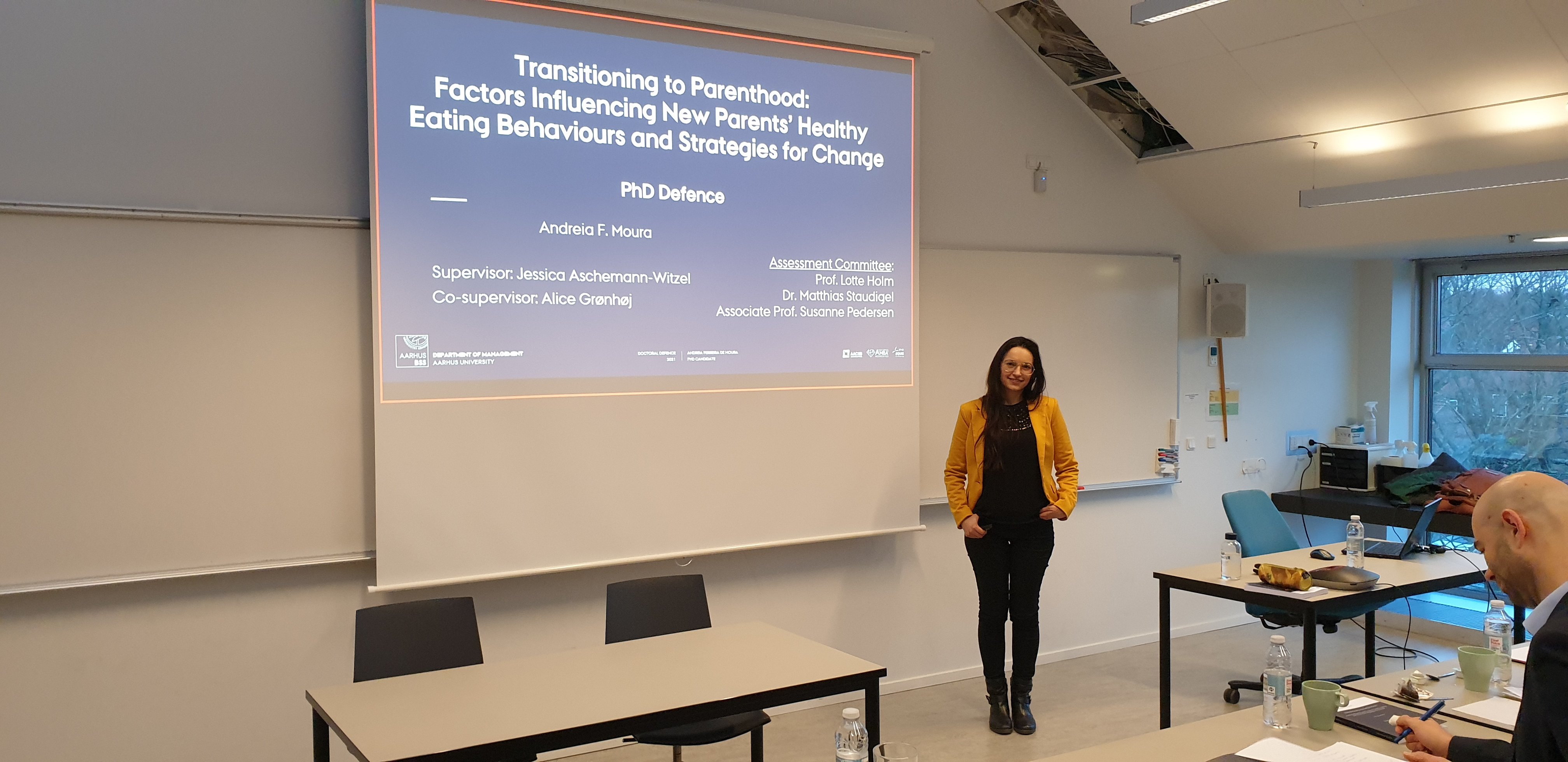New thesis: Transitioning to parenthood: Factors influencing new parents’ healthy eating behaviours and strategies for change

Another PhD defence among the ESRs!
Andreia F. Moura, ESR8, successfully defended the thesis: “Transitioning to parenthood: Factors influencing new parents’ healthy eating behaviours and strategies for change” on November 26.
The defence took place in her home institution, Aarhus University – Denmark, and was celebrated with colleagues, supervisors (Jessica Aschemann-Witzel and Alice Grønhøj) and the Edulia community (online).
Associate Prof. Susanne Pedersen (Aarhus University), Prof. Lotte Holm (University of Copenhagen) Dr. Matthias Staudigel (Technical University of Munich) composed the assessment committee.
Andreia is now working as an Assistant Professor in Clinical Nutrition at the University of Nottingham, UK, where she is responsible for teaching and supervising under and post graduate students in the field of eating behaviours, health and nutrition.
https://www.nottingham.ac.uk/biosciences/people/andreia.moura
Supervisors
Professor Jessica Aschemann-Witzel, University of Aarhus
Professor Alice Grønhøj, University of Aarhus
Committee
Prof. Lotte Holm – University of Copenhagen
Dr. Matthias Staudigel – Technical University of Munich
Associate Prof. Susanne Pedersen -Aarhus University,
Secondments
INRAE, French National Institute for Agriculture, Food and Environment, France): 2 months
Universidad de la República, Uruguay: 1 month
Arla Foods Amba (online secondment due to the pandemic): 3 months
Short summary of thesis
Despite global actions to promote healthy eating, childhood obesity rates continue to rise. In response to this public health challenge, the European Union project “Edulia: Bringing down barriers to children’s healthy eating” was designed. This dissertation is a result of Edulia’s Work Package 7: Children’s healthy eating environment– Nudging and social marketing strategies for change.
As parents provide both the genes and the environment influencing eating habits and weight status to their children, the study of parental eating behaviours is crucial for childhood obesity prevention. This calls for a deeper and more nuanced understanding of factors influencing healthy eating, beginning in the early formation of the family, from the moment adults become parents. The World Health Organization recognizes that a life course approach considering the transition to parenthood is pivotal to tackle the growing obesity epidemic. However, the literature on eating behaviours and barriers to healthy eating during this transition remains insufficient.
How does the transition to parenthood influence adults’ eating behaviours? Does the life event of becoming a parent facilitate or prevent the adoption of healthier eating habits? What are the constraints for healthy eating among new families? How can these possible barriers be addressed by stakeholders?
The overall goal of ESR8’s research was to contribute with new insights to how the transition to parenthood impacts the food life course and healthy eating and to propose potential strategies for change.
To meet this aim, Andreia performed several cross-country mixed methods analyses involving Europe and Latin America. In-depth interviews were conducted in Denmark (n=16), France (n=14) and Uruguay (n=42). This initial study was followed by a social media content analysis comparing maternal discourses in Denmark and France (300 pages of content). Subsequently, online surveys were conducted in Argentina, Denmark and France (a pilot survey in Denmark with 267 mothers followed by the main inquiry with 500 mothers per country), with the goal of identifying barriers to healthy eating and differentiating segments of mothers according to those barriers. The investigation concluded with a food intervention for fathers and their children (n= 15 families), analysed with qualitative methods, namely in-depth interviews.
The findings of six scientific papers provided evidence that the transition to parenthood can represent either a window of opportunity or a downturn in perceived healthy eating among new parents. First, an equalizing effect was found, meaning that self-defined unhealthy eaters perceive to develop healthier eating behaviours, and health-focused eaters perceive to decrease the healthiness of dietary behaviours after becoming parents. The direction of dietary changes in terms of healthiness (healthier or less healthy) is also determined by social cognitive factors (e.g., self-efficacy, social support), socio-economic factors (e.g., financial constraints, working environment and conditions) and social judgment aspects (attitudes towards public nutrition messages and nutrition guidelines). These aspects were responsible for identifying different segments of parents in terms of constraints for healthy eating. These segments were identified in three countries included in the research.
Second, ESR8 showed that gendered parenting practices and expectations influence the adoption of healthy eating habits in the transition to parenthood. Specifically, father’s low engagement with food work, as well as father and child’s unwillingness to try new healthful foods represent constraints to healthy eating in the household.
Third, the investigation revealed general dilemmas between individual freedom and morality of food choices. Andreia identified a widespread dietary cacophony and negative parental reactions to it. The results yielded valuable information about the social construction and judgment of health and nutrition discourse and the misleading, confusing and overwhelming nature of nutrition content for parents in social media and beyond.
This research contributes with new insights to the impact of parenthood on adults’ healthy eating behaviours and proposed actions to address barriers to healthy eating among new families. The knowledge has theoretical implications for academics, adding to the life course approach and social-cognitive literature. Moreover, this work has practical implications for health professionals, policy makers and stakeholders involved with childhood obesity prevention. Crucially, it points out possible side effects of classical nutrition approaches on parents’ healthy eating attitudes and contests current beliefs regarding family dynamics related to healthy eating practices (e.g., Andreia found that stay-at-home mothers might face more barriers to healthy eating compared to mothers who work outside the home). Finally, the insights can prove useful for marketing managers interested in the development of strategies and products targeted at new families’ healthy eating behaviours and practices.
Papers in the thesis
Moura, A. F., & Aschemann-Witzel, J. (2021). Perspectives on sugar consumption expressed on social media by French-speaking and Danish-speaking parents. Social Science & Medicine, 270, 113636. https://zenodo.org/record/4438592#.YFBrePlKg2w
Moura, A.F. and J. Aschemann-Witzel (2020), A downturn or a window of opportunity? How Danish and French parents perceive changes in healthy eating in the transition to parenthood. Appetite, 150: p. 104658. doi:https://doi.org/10.1016/j.appet.2020.104658
early parenthood, ESR8, healthy eating for parents

